
A vibrant and heart-warming closing ceremony at the Bird's Nest Stadium in Beijing on Sunday night brought the curtain down on the 2022 Paralympic Winter Games, which has sent out a message of inclusion, resilience and hope to the world during challenging times.
Chinese President Xi Jinping attended the closing ceremony, with International Paralympic Committee (IPC) president Andrew Parsons hailing that "Beijing 2022 has marked a new dawn for the Paralympic Winter Games" before declaring it close.
Over the past nine days, the Chinese capital, the first city ever to have hosted both the Summer and Winter Paralympic Games, has not only witnessed remarkable feats of para-athletes from around the world but also created a tangible legacy that extends far beyond the sporting arena.
"Beijing 2008 changed the way the Summer Paralympics was delivered forever, this will be the same with the Winter Paralympics," Parsons said. "A new level of the delivery of these Games was set by Beijing 2022."
PUSHING ULTIMATE LIMITS
Four years after winning its first-ever Winter Paralympic medal in PyeongChang 2018, China dominated at these Games with a haul of 61 medals including 18 golds, a fitting ending for the emblem of the Beijing 2022 Paralympics - "Flying High."
The Chinese wheelchair curling team, who took the historic gold in PyeongChang, defended its title in Beijing by beating Sweden 8-3 in the final after a rocky start to the tournament.
Founded in late 2016, China's Para ice hockey team also made a strong showing as it thrashed PyeongChang bronze medalist South Korea to take the bronze in its Paralympic debut.
On International Women's Day, Chinese athlete Yu Jing became just the third woman in the history to play Para ice hockey at the Winter Games. The 38-year-old forward made her Paralympic debut in China's 6-0 win over Italy on the final day of the preliminary round on March 8.
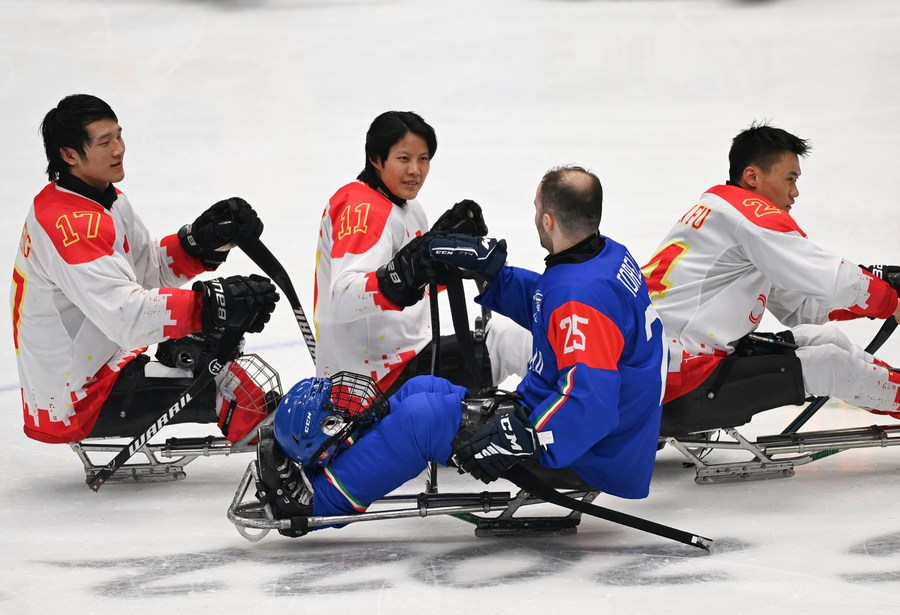
Yu Jing (2nd L) of China greets Francesco Torella (2nd R) of Italy after the para ice hockey preliminary round Group B match of the Beijing 2022 Paralympic Winter Games at National Indoor Stadium in Beijing on March 8, 2022. (Xinhua/Zhang Bowen)
Elsewhere on the snow, Zhang Mengqiu took two golds and three silvers in the women's Para Alpine skiing events to become China's leading medalist, while several others also collected multiple medals at Beijing 2022.
Besides Chinese Paralympians, international athletes have also made breakthroughs in different aspects.
At Sochi 2014, Cecile Hernandez became France's first-ever Para snowboard silver medalist and collected one silver and one bronze at PyeongChang 2018. In 2022, however, she broke two vertebrae in training but made it back to competitions in just two months.
Now at 47 years old, the Frenchwoman finally stood on the highest podium after taking the gold in the women's Para snowboard cross SB-LL2 at Beijing 2022.
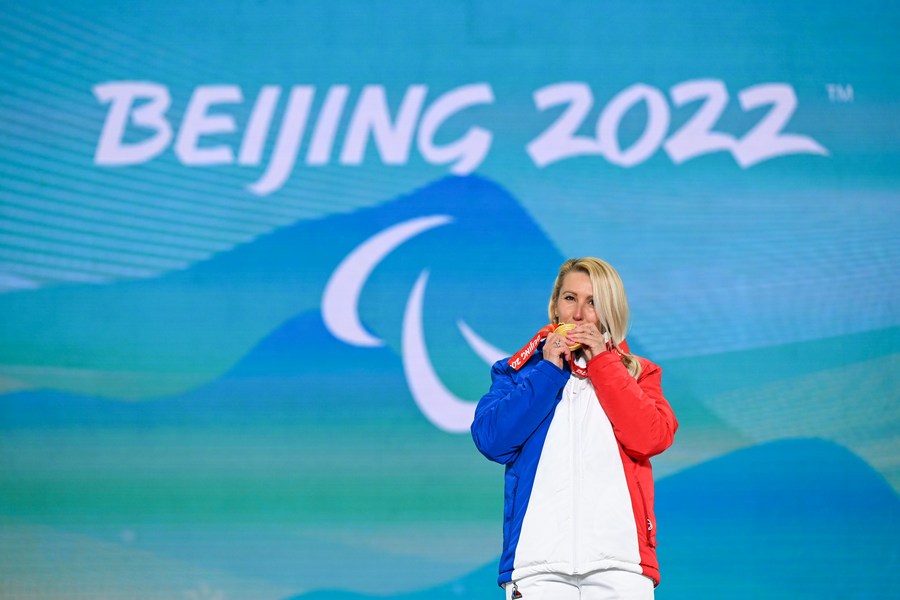
Gold medalist Cecile Hernandez of France kisses the medal during the award ceremony for Para Snowboard Women's Snowboard Cross SB-LL2 event of Beijing 2022 Paralympic Winter Games at Zhangjiakou Medals Plaza in Zhangjiakou, north China's Hebei Province on March 7, 2022. (Xinhua/Hu Chao)
58-year-old Francoise Jaquerod of Switzerland has taken two Para Alpine skiing golds in 1988, before continuing her Paralympic dream in wheelchair curling at Beijing's National Aquatics Center.
Since his Paralympic debut at Salt Lake City 2002, Canadian Para cross-country skier Brian Mckeever remained highly competitive over the past 20 years and added three more golds at Beijing 2022 to his rich collection of 13 titles taken from the previous six editions of Winter Paralympics.
SAFE AND ACCESSIBLE GAMES
With the world still grappling with the COVID-19 pandemic, ensuring the safety of the participants of these Paralympic Games has been a top priority of the Beijing 2022 organizers.
Thanks to strict and effective countermeasures including the closed-loop management system and daily testing, the number of positive cases in the closed-loop has been dynamically dropped to zero during the Winter Paralympics, according to the Beijing 2022 Organizing Committee (BOCOG).
"I think we are very satisfied that we are providing the safe environment to the athletes," Parsons said. "So it's not only about providing them an environment where they don't get the virus, but they feel that they are safe. And I think this is what we are experiencing here."
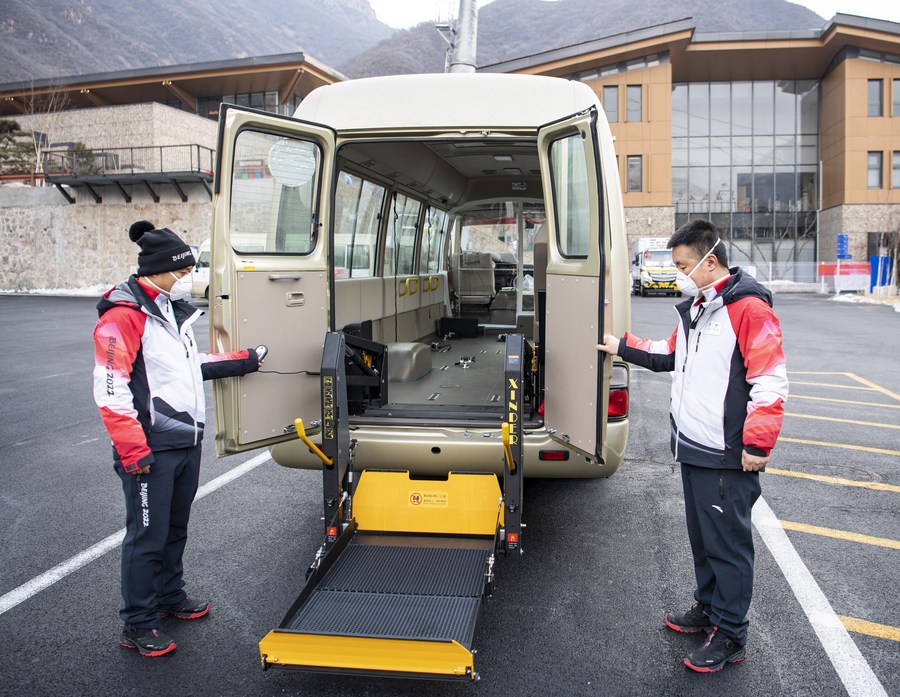
Staff members show a barrier-free van at China's National Alpine Skiing Center in Yanqing District, Beijing on Feb. 28, 2022. (Xinhua/Sun Fei)
Preceding the 2008 Paralympic Games, wheelchair access was put in place throughout Beijing's subway stations. The infrastructure improvement is no less manifest for 2022.
The National Aquatics Center has installed over 100 meters of ramp; the National Alpine Skiing Center has specially designed cable cars for those with lower limb deficiencies. In addition, 41 hospitals, 18 hotels have been upgraded to improve accessibility.
Parsons has called the Beijing 2022 venues "some of the best winter sport venues in the world," which was echoed by many participating athletes and coaches.
"When it comes to accessibility and [being] barrier-free, I think the athletes can speak even better than I can," Parsons said. "Our accessibility experts are very happy about that. So far I did not receive any complaint, which is always a good sign."
"The facilities are perfect. Everything is good and acceptable. We have big rooms and big bedrooms. They have special bedrooms for athletes with wheelchairs," said Dutch coach Nicky Elsewaerd.
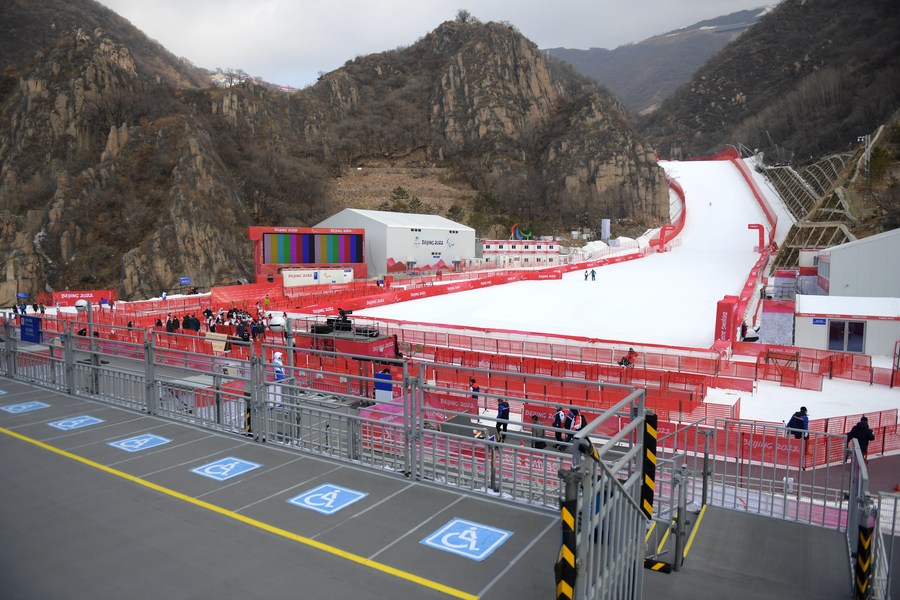
Photo taken on Feb. 28, 2022 shows the barrier-free seats in China's National Alpine Skiing Center in Yanqing District, Beijing. (Xinhua/Zhang Chenlin)
American Paralympic ice hockey athlete Kyle Zych said he felt grateful for the barrier-free facilities installed ahead of the Beijing 2022 Paralympic Winter Games. "We're so lucky to experience such an amazing village and venue."
Meanwhile, the volunteers have contributed to the successful hosting of the Games, as Parsons also lauded their work by saying: "If athletes are the beating heart of any edition of the Games, the volunteers are the soul, with their smiles, energy, and enthusiasm."
"I have experienced five Paralympic Winter Games, and the Chinese volunteers are the best," said Japanese para Alpine skier Gakuta Koike.
DEVELOPING CAUSE OF PEOPLE WITH DISABILITIES
For China, hosting the Paralympics is not just about raising awareness about people with disabilities, it is also about making real material changes that are the basis of a more civilized society.
"The Chinese government has always supported the integration of people with disabilities into society. Programs for persons with disabilities have seen a comprehensive development, including Para sports," said BOCOG vice president Yang Shu'an.
According to BOCOG, China has organized winter sports events for people with disabilities since 2016 and the number of participants has increased from some 10,000 people to more than 300,000 per season.
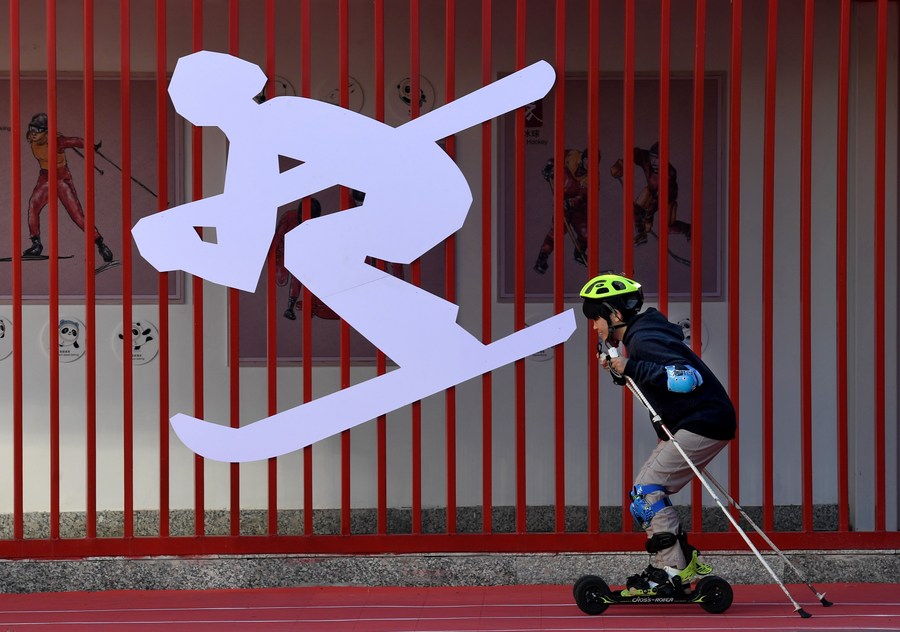
Li Yinuo, an athlete of cross-country skiing team, trains on the campus of Luanchuan County Special Education School in Luanchuan County, central China's Henan Province on Nov. 18, 2021. (Xinhua/Li An)
"In a country with 85 million persons with disability, this is absolutely fundamental," Parson commented.
Although Yu Jing is the only female player in Para ice hockey at these Games, she is not the sole Para ice hockey woman representative in China.
"There are many girls in China who would like to join the sport and there are already many who play it. I am the representative of these female players in this team. I got the chance to play for the national team and be on this stage to show the power of our Chinese women to the world," said Yu.
If nothing else, the increased emphasis China puts on its para-athletes, of which the Beijing Winter Paralympics is just a facet, is a reflection of China's human rights progress.